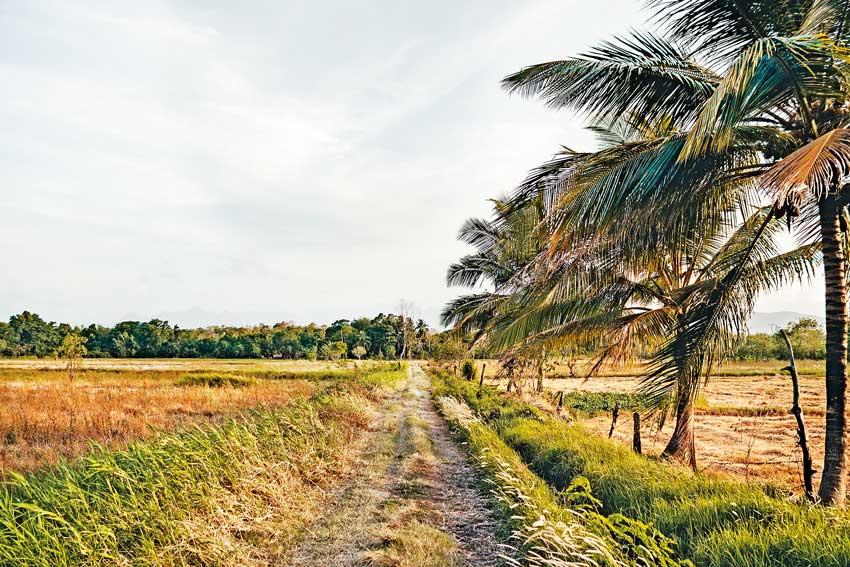Reply To:
Name - Reply Comment
Last Updated : 2024-04-24 11:56:00

Pic by Louise Burton
80-85% of land in Sri Lanka is owned by the government
One of the reasons for low productivity is excessive state involvement
27% of the farmers are landless and 82% of people involved in agriculture have less than two acres
The median income of agriculture based workers is only Rs.16,000
In the age group of 19 to 24, less than 1% are in agriculture
 During the two day conference, “Let’s Reset Sri Lanka ‘’ organised by the Advocata Institute, it was noted that 80 to 85% of the land in Sri Lanka is owned by the government, as research associate Sudaraka Ariyaratne set the foundation for the reform discussion on agricultural land.
During the two day conference, “Let’s Reset Sri Lanka ‘’ organised by the Advocata Institute, it was noted that 80 to 85% of the land in Sri Lanka is owned by the government, as research associate Sudaraka Ariyaratne set the foundation for the reform discussion on agricultural land.
“This is really challenging when it comes to the agricultural sector because if you are a commercial investor who is looking for a big area of land to cultivate or even if you are a traditional farmer, land ownership is a huge issue as the government is very picky about which land they’re going to let private investors and farmers use. Therefore we see a lot of people who want to invest in agriculture being turned away by the system because of the land approval process and various restrictions on that land. So a lot of the time, a lot of investors are discouraged and that has really impacted the agricultural sector of Sri Lanka,” he said.
Ariyaratne believes that one of the main components of agricultural land in Sri Lanka owned by the government is tea plantations. All of these lands were owned by the government since the land was taken over by them in the 1970s. But since 1993, a majority of the tea plantations owned by the government have been given over to the private sectors in the form of a lease for a limited time. Consequently, we see a lot of plantations today being run by private companies as opposed to the government. But still the ownership of these lands is within the government. Yet, there is no sustainability plan and the government hasn’t taken steps to look forward to the future and take corrective measures.
Migara Rodrigo, researcher at Advocata Institute kicked off the presentation explaining that Sri Lanka scored a very poor 51.9 out of 100 for property registration. He also added that the percentage of government-owned land in Sri Lanka is one of the highest in the world. According to their presentation, the major plantation crops including tea and rubber predominantly consist of export crops. Agriculture still contributes to 25% of employment which is a significant percentage. However there is low productivity in this sector.
One reason for this is excessive state involvement in agricultural policy. The state both directs farmers on what types of crops they can grow and on how large their farms are. Therefore average farm sizes have been steadily falling, particularly since the 1972 land reforms, causing fragmentation and low productivity growth. This also limits incomes for farmers, particularly when they are directed to grow low value crops.

if you are a commercial investor who is looking for a big area of land to cultivate or even if you are a traditional farmer, land ownership is a huge issue as the government is very picky about which land they’re going to let private investors and farmers use
-Sudaraka Ariyaratne
High state land ownership
Sri Lanka’s extremely high state land ownership is the result of colonial land policies and subsequently the 1972 land reforms. There are many negative impacts as a result of these reforms and some of the objectives such as to provide land to the landless still have not been accomplished. The 11 to 21 per cent reduction in land value assessed by the World Bank comes about because farmers who often do not have the complete, free and whole titles to their land, cannot utilise its full value as collateral for loans for investment, which will eventually reduce the future output of the agricultural sector. Degradation of land occurs as a result of high state land ownership.
Farmers, plantations and companies do not really have an incentive to properly preserve their land as they only have it on a short-term lease. Meanwhile encroachment on state lands remains high and has contributed to our high deforestation rates particularly in the wet and intermediate zones. The 1970s land reforms expanded upon the land development ordinance and introduced the land reform act, both of which contributed to our high state land ownership at present.
A significant amount of this land was expropriated from foreign corporations, sometimes without payments. Although that land was supposed to be distributed to the landless, it was primarily redistributed to public agencies and cooperatives often at the expense of productivity. Sri Lanka’s productivity in a number of export crops such as tea fell and did not recover until privatisation reforms were implemented many years later. These reforms greatly reduced the rights of farmers and have had other negative consequences.

The state both directs farmers on what types of crops they can grow and on how large their farms are. Therefore average farm sizes have been steadily falling, particularly since the 1972 land reforms, causing fragmentation and low productivity growth
-Migara Rodrigo
Reasons for low productivity in agriculture
Roshan Rajadurai, managing Director at Kelani Valley, Talawakelle and Horana Plantations of Hayleys PLC pointed out that low productivity in agriculture is driven because 71% of the lands are below one hectare in Sri Lanka and 27% of the farmers are landless and 82% of people involved in agriculture have less than two acres. He mentioned that anyone involved in agriculture would agree that this small scale could not have a productive agriculture base.
“If we look at agricultural employment, out of the 8.4 million people employed in agriculture, 26% are employed directly. But unfortunately as mentioned, our GDP contribution is only 7%. The main feature of this is that our agriculture is subsistence scale and not large commercial scale agriculture in general. Out of this agricultural employment of 2.2 million, we have 1.2 million, almost 50% of “own account” workers and contributing family workers another 21%. When you combine them, they constitute 70% of the agricultural labour force,” he said.
This is also another issue in having commercial and productive agriculture because family labour and own account workers do not have guaranteed regular work, wages, statutory dues and other benefits and facilities of corporate sector agriculture workers. Therefore, with this kind of a scenario, Rajadurai believes that it’s not practical to look at large scale commercial agriculture and therein lies a solution that he believes is a good point to convince the government to let go of the available agricultural land for commercial agriculture. Agriculture is also basically a daily wage based job and if one looks at the median income of agriculture based workers, it’s only Rs.16,000 and it’s one of the reasons that people are not coming in adequate numbers to agriculture.
At present, there are also 3,800 acres devoted to BOI (Board of Investment) zones that primarily consist of export processing zones. Many BOI zones such as the EPZ in Katunayake are currently operating at near or full capacity. It is therefore imperative to expand the capacity of these zones to construct new ones and implement policy to liberalise trade and simplify tax structures in the hope of replicating the success of these zones island wide.
Sri Lanka holds great potential for agriculture
Rajadurai brought forth the GDP components of Sri Lanka and stressed that we have to look at agriculture in a very positive manner. He stated that the objective of our agricultural land use must be to derive or extract optimal utility value from a unit of land on a sustainable basis so that the people and the country in the social, economic and ecological areas benefit. Sri Lanka is a small tropical maritime humid island and is blessed with adequate rainfall and 103 rivers. If we look at the employment profile of the 8 million, 27% is in agriculture, in industries about 46% and in services another 27%.
He pointed out that we have six different land zones and different varieties of crops can be grown in Sri Lanka. Because of the advantageous locations of our central hills, all the water is radially flowing down to the low country which is a very good advantage for Sri Lanka. We have 23 soil groups and all these soil groups in their own support different vegetation. Given the extent of the cultivations, paddy takes prominence. Paddy also employs 1.8 million households in Sri Lanka out of 2.2 million households employed in the agricultural sector. The majority of the rural folk are dependent on this industry for their sustenance and livelihood.
Rajadurai then moved on to the importance of agriculture in Sri Lanka. He first stated that it is very important for our food security. “Before the pre-pandemic period, we had 90% food security and 2030 kilo calories national average. It is also important for our national sovereignty. If we are secure in our food and can feed ourselves, we don’t have to be indebted. It provides social security and cohesion to the society as we have seen countries lead on food riots in the absence of food.”
“It’s also important for poverty alleviation and rephrased that 77% of Sri Lankan population is rural based and agriculture is their main source of income. In addition to this almost 27% of our employed people are employed in agriculture directly. Also it’s important for foreign income. We need dollars and agriculture is a sure source of foreign income and most importantly, it provides for effective land use,” he said.

If we look at agricultural employment, out of the 8.4 million people employed in agriculture, 26% are employed directly. But unfortunately as mentioned, our GDP contribution is only 7%
-Roshan Rajadurai
A fresh outlook for agriculture
According to statistics, within four years the average age of farmers has gone up to about 55 years which means young people are not coming into work and the older people are remaining. In the age group of 19 to 24, less than 1% are in agriculture which means agriculture is definitely not an attractive proposition for them. “There is also low status, societal acceptance and dignity for agricultural work. No farmer’s child would want to continue as a farmer. Therefore we need to change and introduce different working models to make agriculture work attractive to the people who are engaged in those areas.” Rajadurai said. He also expressed that our product range and quality has to diversify. There is also low support for institutional research and development.
Way forward
“Mainly, the 82% of land that the government is holding, they have to let it go in a scientific methodical manner.” Rajadurai stressed. How they can do that is to have a non-partisan expert panel to advise and set policies. He also mentioned that we can adopt methods such as GIS mapping to identify the soil and ecosystem in areas and recommend crops that can be grown. He added that we can use our resources and clear a lot of agricultural land and have agriculture zones like the BOI. There should also be a level playing field for producers by giving fair value and correct information asymmetry. Rajadurai explained that if we are going to promote agriculture, we have to provide a lot of stimulus to expand our agriculture with.
Sri Lanka should also stop illogical expropriation of land, the expert opined. He noted that there are many cases where productive crop-bearing land has been taken over by the government and allowed to go to rack and wind. All these and much more would encourage external investments in commercial agriculture and change the historical populist mindset. He concluded saying that there is a definite potential for improvement of our agriculture sector if we take the right policies and that we need to look at it from a positive angle and not from a deadbeat perspective.
Umar Perera Thursday, 11 August 2022 12:26 PM
Large scale farms do not sit well with environmental sustainability plans - which are absolutely necessary given the climate change crises we all have to resolve. The older systems of crop rotation and leaving some fields to lie fallow for a part of the year to improve soil quality are necessary. Farmers need to be supported to become more green-friendly while also being covered by insurance for sickness, disability and unforeseeable crop failures.
M.M.S.B. Manamperi Friday, 12 August 2022 06:58 AM
Good Report. I am a farmer from Kuruwita, Ratnapura. My problem is increasing heavy rain in last 20 years affect to my plants. There were around 180 days rained in around 1980s now 2018 up 205 days. In future it may increase 240 days within 10 years. This situation affected not only Sabaragamuwa, Western Province and part of Southern Province. My question is what are the solutions have with policy makers proposed to face this challenge?
Percy Wijenayake Monday, 15 August 2022 11:05 AM
An excellent venture for unemployed graduates to form a company in scientific farming such as Fruits, Ginger ,Garlic, Yams etc, utilizing drip irrigation, pumps, with computerized irrigation times and diversify later to canning, freezing, and overseas export. They can be designated as Agricultural Development Managers. Consideration must be given to insurance against climatic disasters.

Add comment
Comments will be edited (grammar, spelling and slang) and authorized at the discretion of Daily Mirror online. The website also has the right not to publish selected comments.
Reply To:
Name - Reply Comment
US authorities are currently reviewing the manifest of every cargo aboard MV
On March 26, a couple arriving from Thailand was arrested with 88 live animal
According to villagers from Naula-Moragolla out of 105 families 80 can afford
Is the situation in Sri Lanka so grim that locals harbour hope that they coul